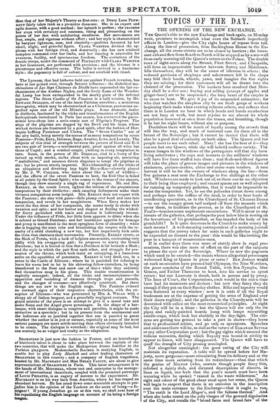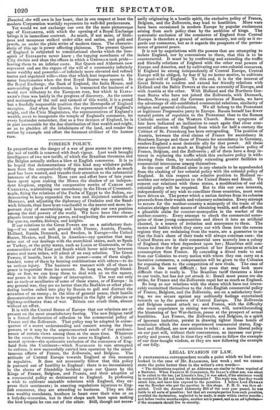TOPICS OF THE BAY.
THE OPENING OF THE NEW EXCHANGE..
THE Queen's ride to the new Exchange and back-again, on Monday next, promises to accomplish what even the Sabbath imperfectly effects in London—give the City eight hours of repose from toil. Along the line of procession, from Buckingham House to the Ex- change, all the cross-streets are to be closed by barriers ; the inces- sant ebb and flow from South to North will be stopped as by a sea-wall from early morning till the Queen's return to the Palace. The double rows of sight-seers along the Strand, Fleet Street, and Cheapside, will form an impenetrable barrier between Surrey and Middlesex. Idle themselves, they will be the cause of idleness in others : the reduced garrisons of shopboys and saleswomen left in the shops may fold their hands, whistle, yawn, and imagine the fine sights they are missing ; for their customers will all be drawn into the channel of the procession. The bankers have resolved that Mon- day shall be a dies non; buying and selling (except of apples and ginger-beer) are to be suspended ; the busy heart of the empire is to cease to beat. We give it joy of its suspended animation ; for who that watches the sleepless city to see fresh gangs of workers beginning their tasks when evening relieves others, and reflects that there is in London no hour in which heads and hands numberless are not busy at work, but must rejoice to see almost its whole population loosened at once from the traces, and breathing, though it be but for eight hours, without aim or purpose.
Doubtless there will be much of loyalty among the crowds that will line the way, and much of maternal care for them all in the breast of the Sovereign ; but it cannot be denied that there will also be a good deal of curiosity on both sides. The Queen and her people meet to see each other. Mary ! she has the best of it—they can see but one Queen, while she will behold endless variety. The waxen images in the windows of the perruquiers will that day have living substitutes ; the caps and bonnets in the milliners' windows will have live faces stuffed into them ; real flesh-and-blood figures will take the place of graven images and pictures in the windows of stationers, picture-dealers, china and stone-ware venders. A rare harvest it will be for the owners of windows along the line—from five guineas a seat near the Exchange to five shillings at the other end. Windows are made to look out of, so there can be no objection to their being thus employed ; and vacant spaces are so well adapted for running up temporary galleries, that it would be impossible to resist the temptation. Yet, to see the palisades thrust down among and perhaps into the coffins of the dead, in order to bear loads of unreflecting spectators, as in the Churchyard of St. Clement Danes —to see the meagre green turf scalped uff from the mounds which cover them, to facilitate the process, as in the Churchyard of St. Paul's—touches some unpleasant associations. Will it occur to any inmate of the galleries, that perhaps the post below him is resting on the breastbone of his grandmother, or has impaled the body of his grandchild ? Is it quite decorous in the Church to make money by such means ? A well-meaning correspondent of a morning journal suggests that the money taken for seats in such galleries ought to be expended on dinners to the poor : this would be like invitiug the poor to a banquet of resurrection-men. If in earlier days there was more of stately show in regal pro- cessions, there was also more of effort on the part of the subjects to please the eyes of the Sovereign. Where be now the pageants which used to be erected—the stands whence allegorical personages welcomed King or Queen in prose or verse ? BEN JONSON would on such an occasion have pressed half Olympus, the Nine Worthies, the posse comitatus of the Round Table, with Sea Nymphs, blue Graces, and Father Thameses to boot, into his service to spout verses : but our Laureate is dumb, both in person and by proxy. The Inns of Court,,the Corporations, each would in the olden time have had its mummers and devices : but now they fancy they do enough if they put on their Sunday clothes. Silks and tapestry would have fluttered at every window : now it is odds if all the Royal tradesmen are at the expense of getting the arms of England over their doors regilded ; and the galleries in the Churchyards will be decorated with calico on the most economical principles. At night the City will be in a blaze : but the Queen will see only the tin pipes and rudely-painted boards bung with lamps resembling candle-cups, which look but shabbily in the day-light. The citi- zens are getting too genteel to take a part in shows—they leave that to professional artists, and go only as spectators. Speeches and addresses there will be, as dull as the verses of ELKANAH SETTLE or any other Corporation poet : but the gay sights which amused the tedious momenta, during which Royalty was bound in civility to appear to listen, will have disappeared. The Queen will have to quaff the draught of City prosing unmingled. Not altogether unmingled : the good eating of the City will maintain its reputation. A table will be spread before her Ma- jesty, more gorgeous—more stimulating from its delicacy and at the same time more satiating from its redundance—than that which the genius of MILTON (who, austere though people fancy him, relished a dainty dish, and dictated descriptions of dinners, in lines so liquid, one feels that the poet's mouth must have been watering while he spoke) "reared in the waste wilderness." As sight and odour of the good cheer steal upon her sense, the Queen will begin to suspect that there is an omission in the inscription over the main entrance to the Exchange—that it ought to run, "The earth is the Lord Mayor's, and the fulness thereof." And when she looks round on the jolly visages of the gowned dignitaries of the City,. and recalls the "broad faces and broad furs" of the Dunciad, she will own in her heart, that in one respect at least the modern Corporation worthily represents its well-fed predecessors. Yet would we not exchange our own for the more picturesque age of ELIZABETH, with which the opening of a Royal Exchange brings it in immediate contrast. As much, if not more, of little- ness and meanness stalked under silks and satins, and gold and jewels, as under the plain attire of modern times. The characte- ristic of this age is power affecting plainness. The present Queen of England is subjected to constitutional checks which the lion- spirit of ELIZABETH never knew ; the topping merchants of the City disdain and shun the offices in which a GRESHAM took pride— leaving them to an inferior caste. But Queen and Aldermen now represent and are the organs of the will of a community infinitely more wealthy and powerful—of infinitely more elevated and refined tastes and regulated wills—than that which lent importance to the same functionaries when the first Royal Bourse was opened. In the Royal Exchange, the Bank of England, the India House, and surrounding places of rendezvous, is transacted the business of a world now tributary to the European race, but which in ELIZA- BETH'S time was barely in the progress of discovery. As the centre and mainspring of the toil and turmoil of this world, it is a proud but a fearfully responsible position that the Metropolis of England occupies. And when the Queen, the representative of England's might, and the Civic Magistrates, the representatives of England's 'wealth, meet to inaugurate the temple of England's commerce, let every bystander remember, that as a free denizen of England, he is in part answerable for the due distribution of that wealth and might, so as to gladden all the inhabitants of the land, and render the nation by example and effort the foremost civilizer of the human race.



























 Previous page
Previous page